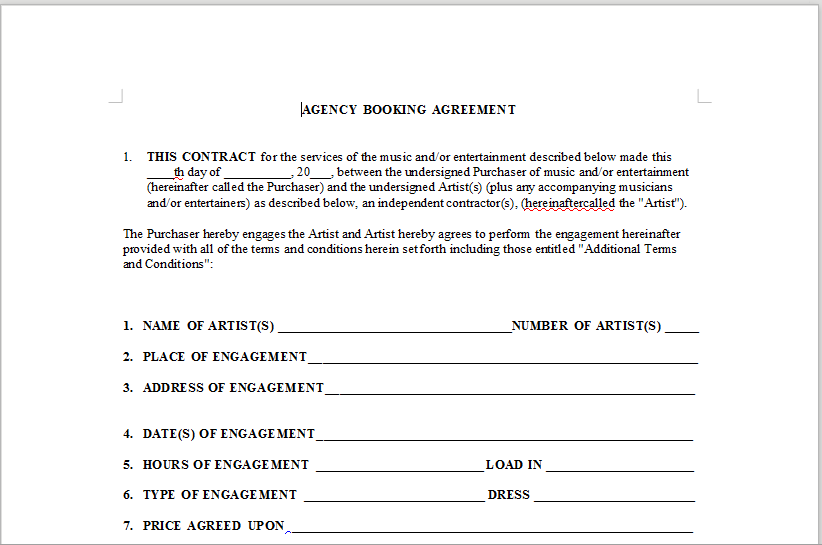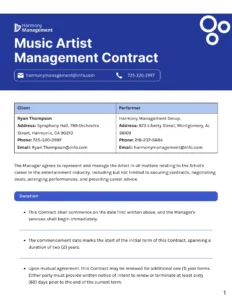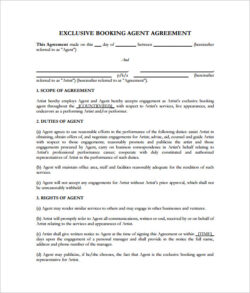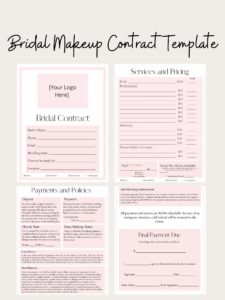Stepping onto the stage and sharing your music with the world is an incredible journey. For many artists, navigating the complex landscape of gigs, tours, and promotional opportunities can feel like a full-time job in itself, often taking away from the creative process. That’s where a dedicated music booking agent comes into play, acting as your professional advocate, securing those vital performance slots and negotiating the best deals on your behalf.
But just like any significant partnership in the music industry, the relationship between an artist and their booking agent needs a clear, legally binding foundation. Without one, both parties are vulnerable to misunderstandings, financial disputes, and misaligned expectations that can quickly turn a promising collaboration into a frustrating ordeal. This is precisely why having a solid music booking agent contract template is not just a good idea, it’s an absolute necessity. It provides a roadmap for your professional journey together, ensuring everyone is on the same page from day one.

Why A Solid Contract Is Non-Negotiable
Imagine embarking on a long road trip without a map or agreement on who pays for gas. It might start fun, but confusion and arguments are almost inevitable. A booking agent contract serves as that essential map, defining the boundaries, expectations, and responsibilities for both the artist and the agent. It’s far more than just paperwork; it’s the bedrock of a healthy, productive professional relationship, safeguarding your interests and providing clarity in every scenario.
One of the primary benefits is the crystal-clear delineation of duties. The contract specifies exactly what the agent is responsible for, from seeking out performance opportunities to negotiating fees and handling logistics. Similarly, it outlines the artist’s obligations, such as providing necessary promotional materials or maintaining a professional demeanor. This level of detail eliminates ambiguity, reducing the chances of either party feeling underserved or overburdened.
Defining Roles and Responsibilities
A well-drafted contract precisely outlines who does what. It covers:
- Agent’s Scope: What type of bookings (live shows, festivals, corporate events), territory, and industries.
- Artist’s Cooperation: Requirements for providing EPKs, availability, and timely communication.
- Authority to Act: The extent to which the agent can make decisions on the artist’s behalf.
Beyond responsibilities, the financial aspect is where a contract truly shines. It meticulously details the commission structure, how and when the agent gets paid, and what expenses are reimbursable. This transparency prevents disputes over earnings and ensures both parties know exactly where they stand financially. Without this written agreement, collecting payments or disputing unfair deductions can become an impossible task, leaving artists vulnerable.
Understanding Commission and Payment Terms
Clarity on finances is paramount. Your contract should cover:
- Commission Rate: The percentage the agent earns from gross or net performance fees.
- Payment Schedule: When the agent’s commission is due (e.g., upon receipt of artist payment, within a certain number of days).
- Deductible Expenses: Which costs (travel, marketing materials) are approved for reimbursement and how they are accounted for.
Finally, a robust contract anticipates the “what ifs.” It includes clauses for dispute resolution, defining how disagreements will be handled – whether through mediation, arbitration, or litigation. It also outlines the conditions under which the agreement can be terminated by either party, including notice periods and any financial implications. This forward-thinking approach provides a safety net, protecting both the artist and the agent should the partnership encounter unforeseen challenges or simply run its course. It’s about building a professional relationship on a foundation of mutual understanding and legal protection.
Crafting Your Agreement: Essential Elements to Include
When you’re ready to formalize your relationship with a booking agent, using a music booking agent contract template can be an invaluable starting point. While a template provides a solid framework, remember that every artist-agent relationship is unique, and it’s crucial to customize it to fit your specific needs and situation. This ensures the document truly reflects the agreement between both parties and serves as a tailored legal shield.
The initial sections of any good agreement focus on the identification of the parties involved. This means clearly stating the full legal names and contact information of both the artist (or the artist’s legal entity, like an LLC) and the booking agency. Following this, the contract needs to establish the “term” of the agreement—its duration. Will it be for one year, with options for renewal? Or is it tied to a specific project or tour? Clarity here prevents misunderstandings about how long the agreement is in effect.
Financial terms are arguably the most critical components. The contract must explicitly state the agent’s commission rate, typically a percentage of the gross income from bookings secured by the agent. It should also specify what income streams are commissionable (e.g., performance fees, merchandise sales, endorsements) and how and when the agent will be paid. Furthermore, it should detail expense reimbursement, outlining which expenses the artist will cover (e.g., travel, accommodation, marketing materials) and requiring clear documentation from the agent.
Beyond the core financial and term clauses, a comprehensive music booking agent contract template will cover a range of other vital provisions. These include the geographical “territory” where the agent is authorized to seek bookings, whether the agreement is “exclusive” (meaning the artist can only use this one agent for the specified territory and services), and intellectual property rights. Additionally, don’t overlook clauses regarding marketing and promotion, requiring the agent to utilize their network and resources to advance the artist’s career, and clear provisions for termination and dispute resolution.
- Party Identification: Full legal names and contact information for artist and agent.
- Term of Agreement: Start and end dates, renewal options, and conditions.
- Scope of Services: Specific duties of the agent, types of bookings, and any limitations.
- Commission Structure: Percentage rate, basis of calculation (gross/net), and payment schedule.
- Exclusivity: Whether the agent is the sole representative for specific services or territories.
- Territory: The geographic area where the agent operates on behalf of the artist.
- Expenses: Detailed list of reimbursable expenses and accounting requirements.
- Reporting and Accounting: How the agent will provide regular statements of bookings and earnings.
- Termination Clauses: Conditions for ending the agreement, notice periods, and post-termination responsibilities.
- Dispute Resolution: Method for resolving conflicts (e.g., negotiation, mediation, arbitration).
- Governing Law: Which state or country’s laws will govern the contract.
- Force Majeure: Provisions for unforeseen circumstances that prevent performance.
A well-drafted contract isn’t just about protecting yourself; it’s about empowering your professional relationships. By laying out clear expectations, responsibilities, and financial terms, you create a foundation of trust and transparency. This allows both the artist and the booking agent to focus on what truly matters: making incredible music and getting it heard by as many people as possible.
Ultimately, taking the time to carefully review and customize your booking agent agreement sets the stage for a harmonious and successful partnership. It ensures that both parties are aligned on goals and processes, minimizing future conflicts and maximizing the potential for career growth and unforgettable performances. It’s a vital step towards professionalizing your music career and securing your artistic future.



